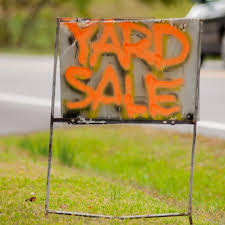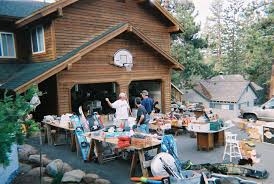
Few things are more common than the sight of handmade signs sticking on telephone poles, street signs or mounted on spring and summer lawns that announce nearby yard and garage sales. Succumbing to curiosity or taking a chance on scoring a great buy leads to another familiar scene: a home, with a variety of cars haphazardly parked around it and persons strolling to and from as well as others browsing among the sales items. Generally, the merchandise consists of clothes, baby articles, and toys. Often larger items are for sale such as exercise equipment, furniture, bedding, and appliances. When the event is an occasional one, there are few issues to worry about. But frequency creates important concerns that affect insurance.
Consider someone breaking into your home and making off with hundreds or thousands of dollars’ worth of property. Or how about a fire or storm destroying a home and most of its contents? Usually, there’s no problem since a homeowners policy will handle such losses. However, if a significant amount of the property was stored for sale, that property may either only qualify for limited coverage or may even be ineligible for protection. Property offered at your yard for sale which belongs to others (sold on consignment) is another class of property that may have only limited protection available or, depending on circumstances, might be considered business property and be disqualified from coverage. Example: Joan’s house is broken into the night before her big yard sale. Among the items stolen was a large, expensive set of drums worth nearly $1,000. It belonged to a friend who asked her to put it on display during her sale. Joan’s insurance company denies protection, claiming it was goods for sale and not personal property.

Similar considerations exist concerning legal liability. For instance, a visitor comes onto your premises and then fractures a leg and hip when tripping on an exposed tree root. Because she was old and frail, the injuries require surgery and a long rehab. The visitor sues you for hospital, surgery and other expenses. Normally one’s insurance policy would defend you against the lawsuit and, if necessary, pay any awarded damages. But what if, instead of a friendly visitor, she had come onto the property to look at items on sale? That could cause a serious coverage issue.
Determining factors for either property or liability coverage are how often sales occur and what income has been made over a period of time (usually the 12 months before the date of a loss). Depending on those details, the activity involved in the loss could be considered a business. In such instances, coverage may not exist under a basic homeowners policy.
Yard sales may appear to be a safe activity, but there are genuine risks to the seller (property owner) and to the customers who are invited onto the property. It makes sense, regardless of your insurance situation, to take steps to minimize the chances of problems occurring.
Safety – property owners bear responsibility for the safety of their guests. A yard or garage sale represents an invitation for others to come onto your premises for a financial benefit. This means that a higher level of watchfulness is due to these legal invitees. It is important that all reasonable precautions be taken to ensure their safe use of your premises before, during and after a sale.
- Take care in how merchandise is set up and displayed, especially any items that have the potential for causing injury, such as breakables, tools, motorized items.
- Clean up any spills immediately, especially any involving broken glass.
- Make sure your premises is free of any obvious dangers to customers/shoppers, especially trip hazards.
- If you have pets, make sure they are kept away from customers to eliminate any chance for attacks.
- Secure access to a covered or shaded area, particularly as a checkout area. On hot days, this can provide a cool down area for sellers and shoppers.
- Have access to a fully charged phone to call for assistance in case of emergencies or to arrange for help for food or bathroom breaks.
- Limit access to the shopping area by children, both those who are part of the seller’s household and those belonging to shoppers. Sales areas can be hazardous, particularly parts of the yard used for parking cars.
- Keep drinking water and spray bottles available to prevent and/or to treat dehydration.
Security – you want to minimize any chances that you are victimized by using practices that keep persons and property safe.
- Make sure that all doors to your home are locked. If you need easier access to your home during the sale, yourself or another trusted person should be stationed near the door.
- Prior to a sale, keep garage doors locked when sales items are stored there.
- Set up guards or barriers to discourage any access to your property before or after the sale.
- Do not allow shoppers or customers entry to your home, be aware of nearby public places where they can get safe access to restrooms (gas stations, restaurants, etc.).
- Take great care in how cash is handled, particularly if you decide to use a cash box. If the latter method is used, be certain that a person is dedicated solely to the checkout area.
For both safety and security reasons, do not run a yard sale alone. A friend or relative as an assistant is a must to making sure that customers aren’t endangered and to reduce chances of theft. Also, never leave the sales area unattended.
If you have yard sales, you should check to see if their frequency and their sales volume create a need for additional protection, such as a form that covers home businesses. An insurance professional is in an ideal position to help you!
COPYRIGHT: Insurance Publishing Plus, Inc. 2015
All rights reserved. Production or distribution, whether in whole or in part, in any form of media or language; and no matter what country, state or territory, is expressly forbidden without written consent of Insurance Publishing Plus, Inc.

 Contact
Contact
 Email an Agent
Email an Agent

 Click to Call
Click to Call Get Directions
Get Directions


